Most Black adults engage in traditional religious practices, such as attending religious services and praying. A majority (61%) say they go to religious services at least a few times a year, including one-third who report that they typically go each week. Frequent prayer is even more common, with 63% saying they pray outside of religious services on a daily basis. Fewer (38%) say they read scripture outside of religious services several times per week, although by all three of these measures Black Americans are more religious than U.S. adults overall.
Even when the survey was conducted, mostly before the coronavirus pandemic caused many churches to stop holding in-person services, three-in-ten Black Americans said they tuned into religious services online, on TV or on the radio on a weekly basis. A subsequent survey in July 2020, in the midst of the outbreak, showed that about three-quarters of Black Americans who had previously reported attending in-person services at least monthly had recently tuned in to virtual services.
This chapter also explores what leadership roles, if any, Black adults play in their congregations, how often they participate in prayer groups or scripture study groups, and the frequency with which they engage in spiritual practices such as praying at a home altar or shrine, burning candles or incense for religious or spiritual reasons, or consulting fortune-tellers, such as a diviner or reader.
Women and older Black adults tend to engage in many of these religious activities at higher rates than men and younger Black adults, respectively. And on the whole, by many of the standard measures of religious practice measured in the survey, Black Protestants appear to be more religious than Black Catholics, as do African immigrants when compared with U.S.-born Black Americans.
One-third of Black adults say they attend religious services weekly; slightly more say they rarely or never attend
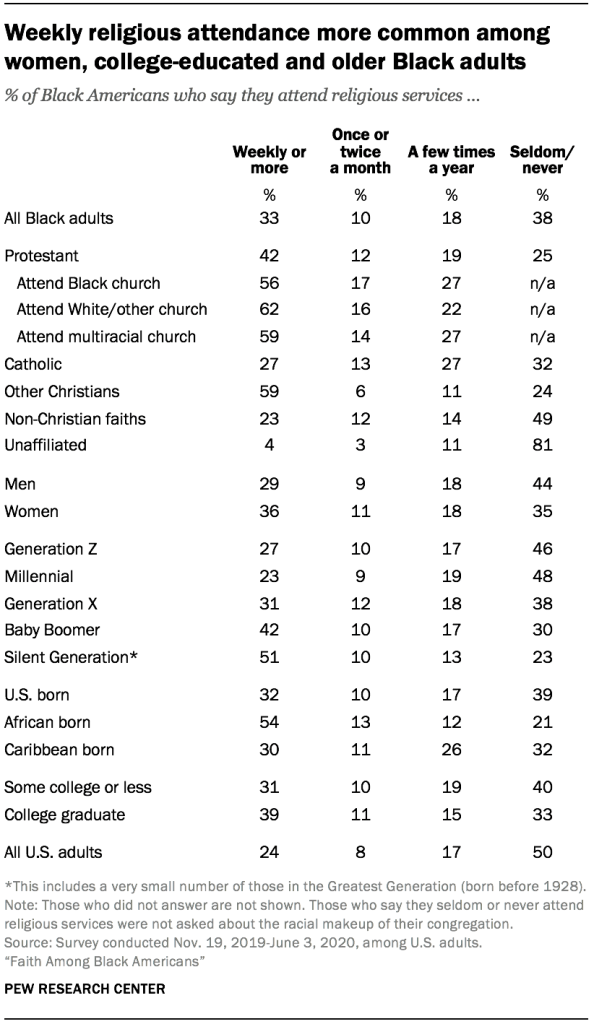
One-third of Black adults say they go to religious services at least once a week (33%). An additional 28% say they attend either once or twice a month (10%) or a few times a year (18%). And 38% say they seldom or never attend services.
Black Protestants attend services more frequently than Black Catholics, but not more than other Christians. Four-in-ten Protestants (42%) say they attend church on a weekly basis, compared with roughly a quarter of Catholics (27%). However, among Black Americans who identify with other Christian religions – most of whom are Jehovah’s Witnesses – 59% attend at least once a week. Among religiously unaffiliated Black adults, just 4% say they attend religious services weekly, while fully eight-in-ten (81%) say they seldom or never attend religious services.
Frequent attendance at religious services is much more common among older Black adults than among younger ones, consistent with the pattern among U.S. adults overall. For example, 51% of Black adults in the Silent Generation or older say they attend religious services weekly, compared with about one-quarter of Millennials (23%) and Generation Z (27%).
African immigrants (54%) are much more likely to attend religious services weekly than are immigrants from the Caribbean (30%) or U.S.-born Black adults (32%). In addition, women and college-educated Black adults are more likely than men and those without a college degree, respectively, to attend on a weekly basis, though these differences are more modest.
Most respondents took the survey prior to the coronavirus outbreak that closed many congregations or limited their attendance.
Personal prayer is common among Black adults, even among Protestants who rarely attend church
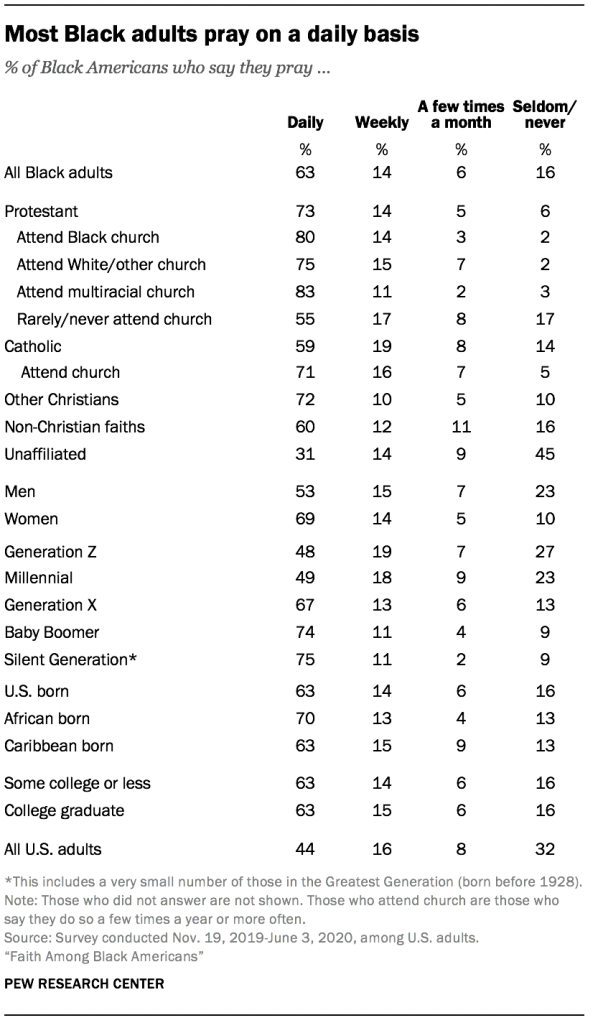
Most Black adults regularly engage in personal prayer, with 63% saying they pray at least once a day, while 14% pray on a weekly basis. Another 6% say they pray a few times a month, while 16% of Black adults say they seldom or never pray.
Most Black adults who identify with a religion pray daily, whether they are Protestants (73%), Catholics (59%), Christians of other traditions (72%), or members of non-Christian faiths (60%). Even among Black Americans with no religious affiliation, three-in-ten (31%) report praying daily, and 45% pray at least weekly.
Among Black Protestants, frequent prayer is common even among those who rarely go to church: Among Protestants who say they seldom or never attend religious services, 55% say they pray every day, and just 17% say they rarely or never pray.
About four-in-ten Black adults meditate, read scripture regularly
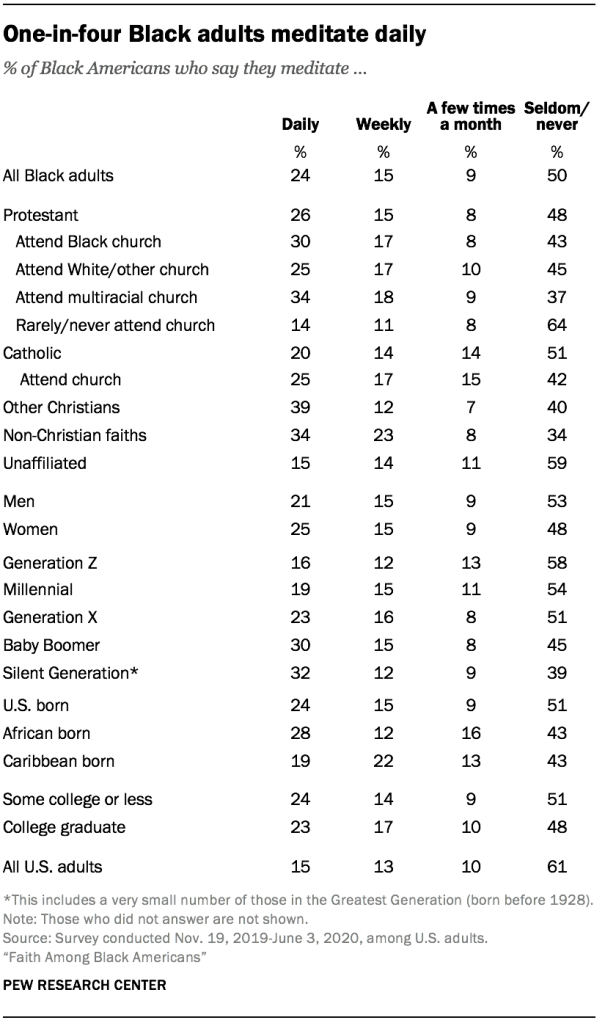
Roughly four-in-in ten Black adults say they meditate at least weekly, including one-quarter who say they do this daily (24%) and 15% who meditate weekly. Another 9% say they meditate a few times a month, while fully half seldom or never meditate.
Four-in-ten or more churchgoing Black Protestants and Catholics meditate on a daily or weekly basis. By comparison, somewhat fewer Protestants who rarely or never attend religious services (26%) or religious “nones” (29%) meditate this often.
As with prayer, those in Generation X and older are more likely than Millennials and members of Generation Z to meditate at least weekly.
Black adults are more likely to engage in meditation than U.S. adults overall. While four-in-ten Black adults meditate at least weekly, roughly one-quarter of U.S. adults say they meditate that often (27%).
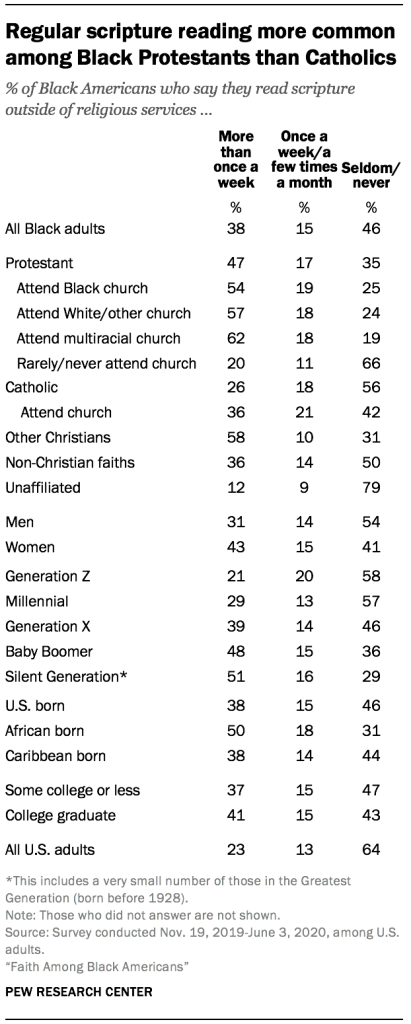
About four-in-ten Black adults read scripture outside of religious services several times a week or more often, while 15% read scripture about once a week or a few times a month and 46% seldom or never do this.
Black Protestants who rarely or never attend church are less likely than other Protestants to say they read scripture regularly.
About half of Black Baby Boomers (48%) and those in the Silent Generation (51%) read scripture outside of religious services several times each week, compared with four-in-ten members of Generation X (39%), three-in-ten Millennials (29%) and just one-in-five in Generation Z (21%).
A larger share of women than men read scripture multiple times per week (43% vs. 31%). And African immigrants are more likely to regularly read scripture than U.S.-born or Caribbean-born Black Americans.
At the same time, Black adults are more likely to read scripture on a regular basis than the U.S. public overall. While 38% of Black adults read scripture multiple times per week, 23% of U.S. adults do the same. And nearly two-thirds of U.S. adults seldom or never read scripture outside of religious services, compared with 46% of Black adults.
Most Black adults never burn candles for spiritual reasons, consult a diviner
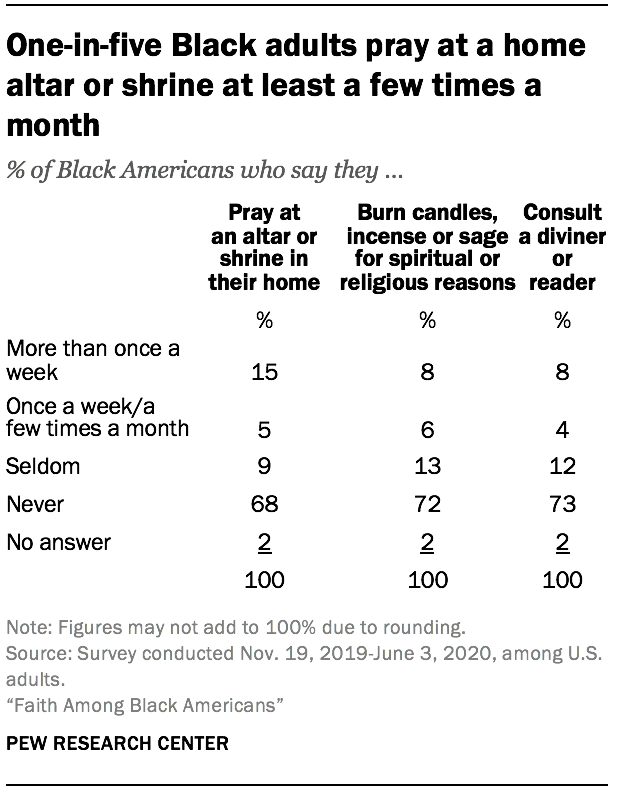
The survey also asked respondents about a variety of other personal religious practices, including praying at an altar or shrine; burning candles, incense or sage for spiritual or religious reasons; and consulting a diviner or reader. Overall, 15% of Black Americans surveyed say they pray at a home altar or shrine more than once a week, while 8% burn candles, incense or sage for spiritual or religious reasons as often, and 8% also say they consult a diviner or reader several times a week. Most Black adults say they never participate in each of these three activities.
Black Catholics (20%) are more likely than Black Protestants (11%) to say they burn candles, incense or sage for spiritual or religious reasons at least a few times a month. This could reflect participation in the Catholic devotional practice of burning candles in churches or at certain times of the year (such as Advent). And, though more religious by many measures, African immigrants are about as likely as U.S.-born Black Americans to consult a diviner or reader.
Black Protestants more likely than Black Catholics to attend prayer groups, scripture study, religious classes
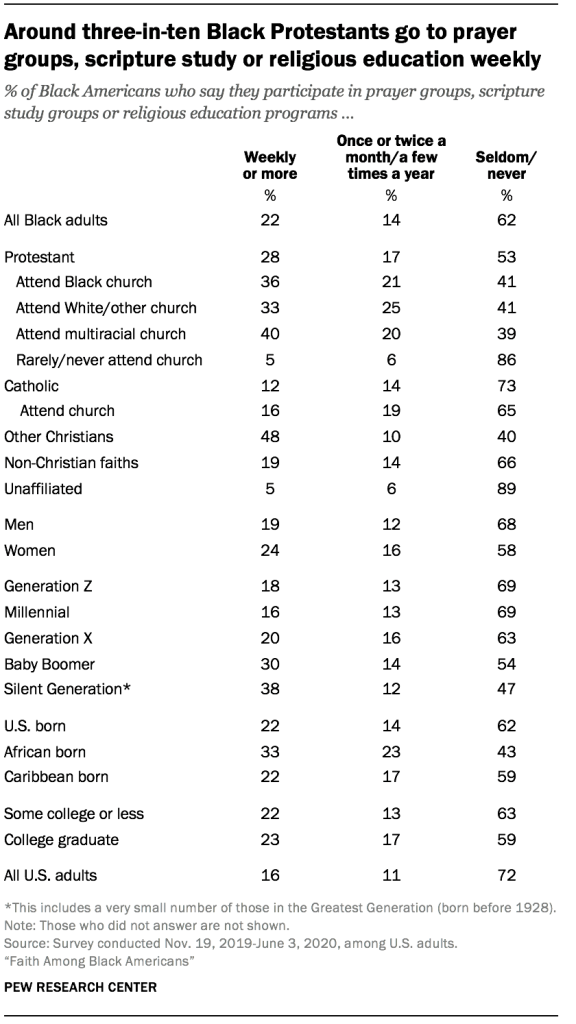
About a fifth of Black adults (22%) say they participate in prayer groups, scripture study programs or religious education programs at least once a week. Another 14% say they do so monthly or a few times a year, while the majority (62%) say they seldom or never partake in such religious activities.
Black Protestants (28%) are more likely to take part in these activities on a weekly basis than Catholics (12%), although an even higher share of people in other Christian groups (such as Jehovah’s Witnesses) do this (48%).
African immigrants are more likely than U.S.-born or Caribbean-born Black adults to say they participate in prayer or scripture groups, mirroring patterns on some other measures of religious engagement.
Three-in-ten Black Protestants who attend Black churches say they play a leadership role
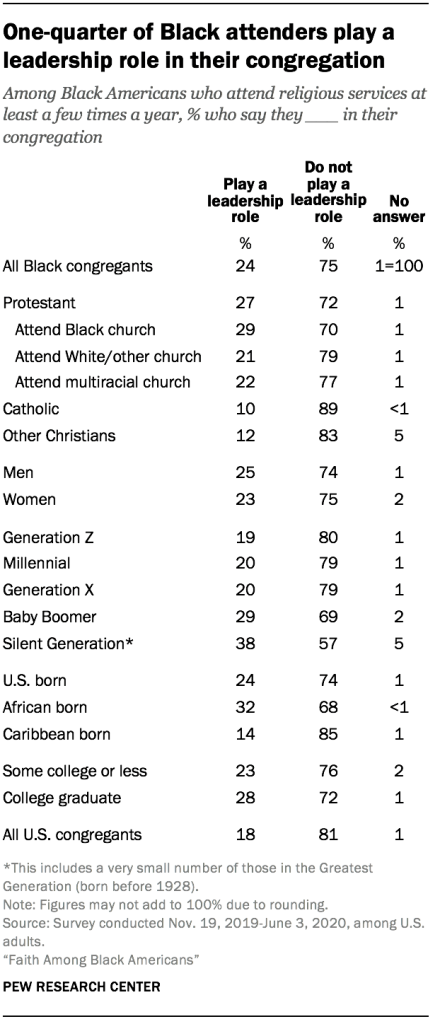
The survey asked Black adults who attend religious services at least a few times a year if they personally play any formal or informal leadership role in their congregation. About one-quarter say they do have a leadership role in their congregation, whether as deacons, ushers, members of the clergy or other roles.
Among Black churchgoers, Protestants are more likely than Catholics to say they play a leadership role at their church (27% vs. 10%). And among Protestants, members of Black churches are more likely to say they have a leadership role than are congregants in Protestant churches with other racial compositions.
Older Black adults are more likely than younger ones to be leaders in their congregations. About four-in-ten in the Silent or older generations say they have a leadership role at their congregation, compared with three-in-ten Baby Boomers (29%) and one-in-five in younger generations.
Though women are more likely than men to attend religious services or participate in prayer groups, they are equally likely to say they play a leadership role in their congregation.
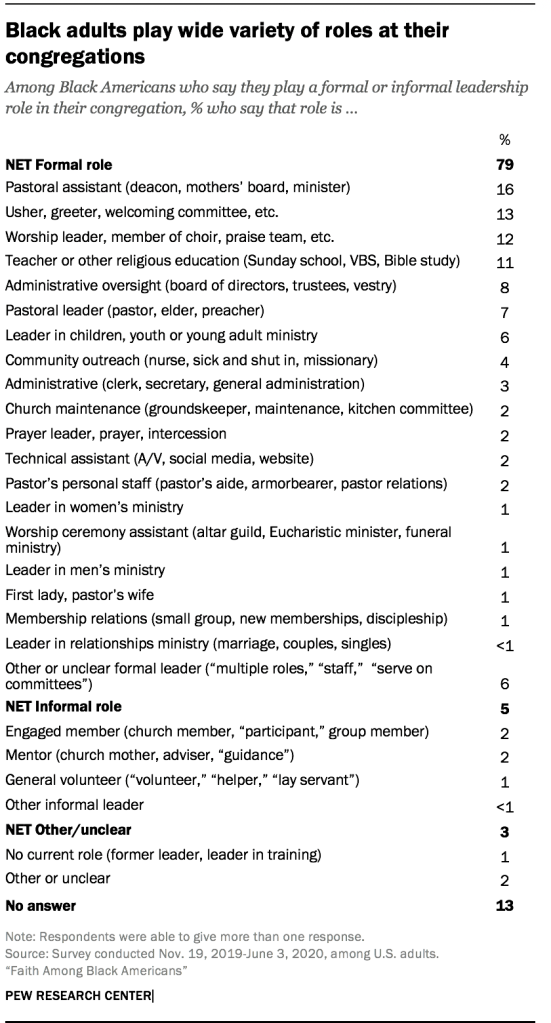
Holding a leadership role in a congregation is slightly more common among Black adults who attend religious services at least a few times a year than it is among all U.S. adults who attend that often (24% vs. 18%).
The Black adults who play a leadership role in their congregation were asked to describe, in their own words, what that role is. Their responses ranged from more formal roles, such as a pastor or deacon, to more informal roles, such as serving as a mentor or a general volunteer.
The most common types of responses include a pastoral assistant, such as a deacon (16%); an usher, greeter or member of the welcoming committee (13%); a worship leader or member of the choir or praise team (12%); and a religious educator, such as a teacher at Sunday school or vacation Bible school (11%).
Others mention roles such as a pastor (7%), leader in youth ministry (6%), prayer leader (2%), or leader in women’s (1%) or men’s (1%) ministry.
Before the COVID-19 outbreak, three-in-ten Black adults listened to sermons online, on TV or on the radio on a weekly basis
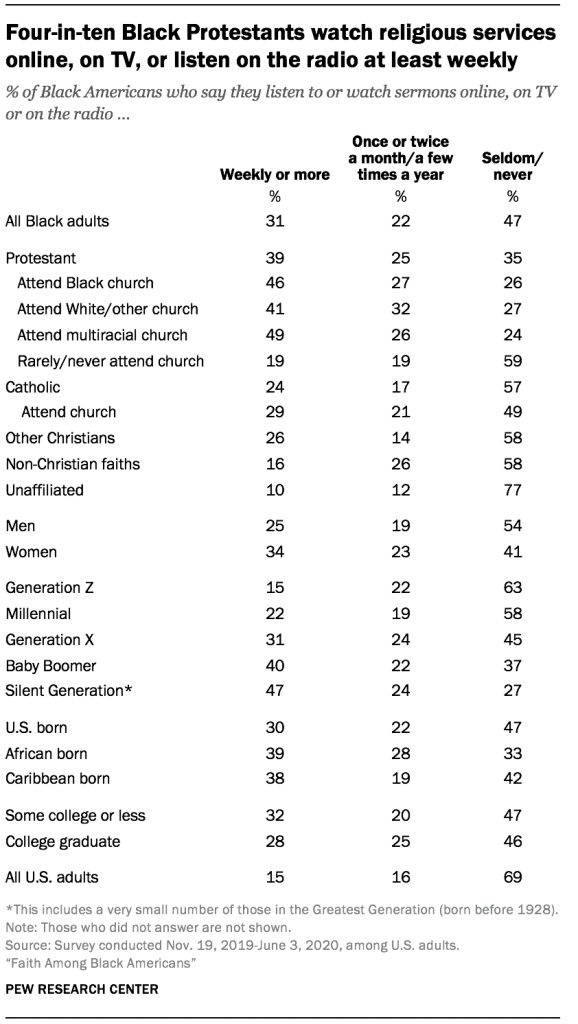
In addition to asking about in-person attendance at religious services, personal prayer practices and participation in scripture study, the survey also asked respondents how often they watch or listen to religious services online, on TV or on the radio. The survey, which was conducted mostly before the COVID-19 outbreak intensified in the U.S. in March 2020, found that about three-in-ten Black adults report doing so at least once a week (31%), while 22% do this on a monthly or yearly basis and nearly half (47%) say they seldom or never participate in virtual services.
A higher share of Black Protestants (39%) than Catholics (24%) watch or listen to sermons virtually on a weekly basis. And among those who attend in-person religious services at least once or twice a month, about half of Protestants (53%) also watch or listen to virtual services weekly, as do somewhat fewer Catholics (37%). By comparison, 16% of Black adults who attend in person a few times a year or less often regularly consume sermons virtually.
Due to the survey’s timing (it was mostly conducted prior to the coronavirus outbreak), most respondents answered these questions before houses of worship cancelled or restricted attendance at in-person services due to the virus. A subsequent Pew Research Center survey, conducted in July 2020, asked respondents whether they had been watching services online or on TV in the midst of the outbreak. In that survey, 77% of Black of adults who, prior to the outbreak, said they typically attend religious services at least monthly also said that they had watched religious services online or on TV in the month before the July survey was conducted. This compares to 72% of all U.S. adults who attend religious services at least monthly who were tuning into virtual religious services during the pandemic.




